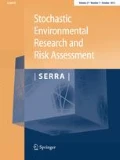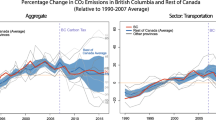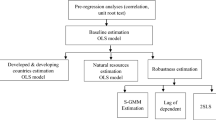Abstract
This study explores the moderating mechanism of fiscal decentralization on the relationship between environmental regulations and carbon emissions. Using longitudinal data of 30 provinces in China from 2002 to 2017, a spatial econometric model was constructed to empirically test the moderating effect of fiscal decentralization, as well as its spatial and temporal differences. The highlights of the results are as follows: (1) Environmental regulations has significantly curbed regional carbon emissions, and the suppression effect remains consistent over spatial and temporal stages, which indicates it exerts a positive effect in carbon control. (2) Fiscal decentralization exacerbates carbon emissions, although this negative effect is not significant in general. However, there are significant spatial regional differences in its impact on carbon emissions. Fiscal decentralization significantly suppresses carbon emissions in the eastern region, exacerbates carbon emissions in the western region, and has no significant impact on carbon emissions in the central region. This shows that local governments in China prioritize economic development over environmental protection and carbon control. (3) The moderating effect of fiscal decentralization on the relationship between environmental regulations and carbon emissions is not significant for the entire country as a whole. However, there are significant spatial regional differences in this moderating effect, and the relationship was found to be significant in the Western region. (4) There are no significant time-phased differences in the effects of environmental regulations, fiscal decentralization, and its cross item on carbon emissions.





Similar content being viewed by others
References
Adam A, Delis MD, Kammas P (2014) Fiscal decentralization and public sector efficiency: evidence from OECD countries. Econ Gov 15:17–49
Aiken LS, West SG (1991) Multiple regression: testing and interpreting interactions: Institute for Social and Economic Research (ISER). Eval Pract 14:167–168
Anselin L (1995) Local indicators of spatial association-LISA. Geogr Anal 27:93–115
Balli HO, Sorensen BE (2013) Interaction effects in econometrics. Empir Econ 45:583–603
Cheng S, Fan W, Chen J, Meng F, Liu G, Song M, Yang Z (2020) The impact of fiscal decentralization on CO2 emissions in China. Energy. https://doi.org/10.1016/j.energy.2019.116685
Ding X, Tang N, He J (2019) The threshold effect of environmental regulation, FDI agglomeration and water use efficiency under “double control actions”—an empirical test based on yangtze river economic belt. Water 11:452–464
Ding P, Sun Y, Mei Z (2019). Fiscal decentralization,local government behavior and environment pollution-empirical analysis based on SO2 emissions in 30 provinces. Inquiry into Economic Issues 37–48.
Du J, Chen Y, Song M (2017). Fiscal decentralization, environmental regulation and green total factor productivity. Sci Decis 65–92.
Du W, Wang F, Li M (2020) Effects of environmental regulation on capacity utilization: evidence from energy enterprises in China. Ecol Ind. https://doi.org/10.1016/j.ecolind.2020.106217
Escaleras M, Chiang EP (2017) Fiscal decentralization and institutional quality on the business environment. Econ Lett 159:161–163
Farzanegan MR, Mennel T (2012) Fiscal decentralization and pollution: institutions matter. Magks Pap Econ 22:1–28
Fu Y (2010) Fiscal decentralization, government governance and supply of non-economic public goods. Econ Res J 8:4–15
Hampf B, Rødseth K L (2014). Optimal profits under environmental regulation: The benefits from emission intensity averaging. Annals of Operations Research 1–24.
He Q (2015) Fiscal decentralization and environmental pollution: evidence from Chinese panel data. China Econ Rev 36:86–100
Hu W, Wang D (2020) How does environmental regulation influence China’s carbon productivity? An empirical analysis based on the spatial spillover effect. J Clean Prod. https://doi.org/10.1016/j.jclepro.2020.120484
Hu M, Huang T, Yu H, Tung C (2018) Stochastic competitive analysis of hydropower and water supplies within an energy-water nexus. Stoch Env Res Risk Assess 32:2761–2769
Huang Q, Gao M (2016) A research on the energy conservation and emission reduction effect of China’s environmental regulation tools. Sci Res Manag 1:30–43
Huang Q, Guo M (2017) Study on energy conservation and emission reduction effects of environmental regulation-empirical analysis based on panel score. Sci Sci Technol Manag 38:30–43
Huang G, Zhou Y (2014). Fiscal decentralization and energy conservation and emission Reduction-Based on the perspective of transfer payment. J Renmin Univ China 67–76.
Huang R, Li Y, Chen G (2014) Environmental audit-based model on the regulation of the energy saving and emission reduction. Oper Res Manag Sci 23:23–34
Karo E (2012) Modernizing governance of innovation policy through ‘decentralization’: a new fashion or a threat to state capacities? Innovation 14:495–509
Li G, Zhang W (2019) Environmental decentralization, environmental regulation and industrial pollution control efficiency. Modern Econ Sci 41:26–38
Li L, Liu X, Ge J, Chu X, Wang J (2019) Regional differences in spatial spillover and hysteresis effects: a theoretical and empirical study of environmental regulations on haze pollution in China. J Clean Prod 230:1096–1110
Lin B, Xu B (2020) R&D investment, carbon intensity and regional carbon dioxide emissions. J Xiamen Univ (Arts & Soc Sci Edn) 80:70–84
Liu Y, Feng H (2011). Corruption, efficiency of public spending and long-term economic growth in China. Econ Res J 17–28.
Liu S, Yang D (2019) Can anti-corruption curb environmental pollution in China? -Analysis based on the interaction between anti-corruption and environmental regulations. Contemp Econ Manag 42:1–10
Liu G, Yang Z, Chen B, Zhang Y, Su M, Ulgiati S (2016) Prevention and control policy analysis for energy-related regional pollution management in China. Appl Energy 166:292–300
Liu J, Chen X, Wei R (2017) Socioeconomic drivers of environmental pollution in china: a spatial econometric analysis. Discret Dyn Nat Soc 2017:1–13
Liu L, Ding D, He J (2017) Fiscal decentralization, economic growth, and haze pollution decoupling effects: a simple model and evidence from china. Comput Econ 54:1–19
Liu Y, Luo N, Wu S (2019) Nonlinear effects of environmental regulation on environmental pollution. Discret Dyn Nat Soc 2019:1–10
Lu F, Yang H (2019). Environmental decentralization, local government competition and ecological environment pollution in china. Ind Econ Res 113–126.
Luo N, Wang Y (2017). Fiscal decentralization, environmental regulation and regional ecological efficiency: an empirical study based on dynamic spatial dobin model. China Popul Resourc Environ 110–118.
Lv X, Dai C (2015). Study on the provinces efficiency of environmental regulation in china: From the perspective of institutional constraints. Collect Essays Finance Econ 105–111.
Pan M, Wu S, Zhang J (2017). Chinese decentralization, environmental regulation and haze pollution. Rev Ind Econ 5–19.
Qi M, Lu H, Xu Y (2014). Research on the reform of environmental decentralization system: Institutional changes, quantitative measurement and effect evaluation in China. China Ind Econ 33–45.
Que W, Zhang Y, Liu S, Yang C (2018) The spatial spillover effect of fiscal decentralization on local public provision: mathematical application and empirical estimation. Appl Math Comput 331:416–429
Shao S, Yang L, Gan C, Cao J, Geng Y, Guan D (2016) Using an extended LMDI model to explore techno-economic drivers of energy-related industrial CO2 emission changes: A Case study for Shanghai (China). Renew Sustain Energy Rev 55:516–536
Tu Y, Peng B, Wei G, Elahi E, Yu T (2019) Regional environmental regulation efficiency: spatiotemporal characteristics and influencing factors. Environ Sci Pollut Res 26:1–10
Wang L, Lei P (2016) Fiscal decentralization and high-polluting industry development: city-level evidence from chinese panel data. Int J Smart Home 10:297–308
Wang J, Zhang K (2014). Fiscal decentralization, local officials and carbon emissions. Modern Finance 3–14.
Wang Y, Zuo Y, Li W, Kang Y, Chen H (2018) Does environmental regulation affect CO2 emissions? Analysis based on threshold effect model. Clean Technol Environ Policy 3:565–577
Wu H (2015). Carbon emission reduction in china: spatial and temporal pattern, evolution mechanism and policy suggestions -theory and method based on spatial econometrics. Manag World 3–10.
Xiu J, Liu H (2014) Energy conservation and emission reduction environmental regulations and chinese industrial TFP. Nanjing J Soc Sci 1:27–33
Xu X, Zhang L, Chen L, Liu C (2019) The role of Soil N2O emissions in agricultural green total factor productivity: an empirical study from China around 2006 when agricultural tax was abolished. Agriculture 5:150. https://doi.org/10.3390/agriculture10050150
Xu X, Xu Z, Chen L, Li C (2019) How does industrial waste gas emission affect health care expenditure in different regions of china: an application of bayesian quantile regression. Int J Environ Res Public Health 16:2748–2759
Yang Y, Niu G, Tang D, Zhu M (2018) Spatial Econometric analysis of the effect of government governance on regional emission reduction: evidence from China. Polish J Environ Stud 27:2833–2842
Yang Y, Niu G, Tang D, Zhu M (2019) Does environmental regulation affects the introduction of FDI in china?–Empirical research based on spatial durbin model. Polish J Environ Stud 28:415–424
Yang Y, Tang D, Zhang P (2020) Double effects of environmental regulation on carbon emissions in china -empirical research based on spatial econometric model. Discret Dyn Nat Soc 1:1–12
Yang Y, Tang D, Zhang P (2020) Effects of fiscal decentralization on carbon emissions in China. Int J Energy Sect Manage 14:213–228
Yushkov A (2015) Fiscal decentralization and regional economic growth: theory, empirics, and the Russian experience. Russ J Econ 1:404–418
Zhang X (2013). A literature review on the relationship between fiscal decentralization and environmental pollution. Comparison of Economic and Social Systems 246–253.
Zhang Y (2015) China’s Regional trade patterns under the perspective of carbon emission: pollution haven and factor endowment. China Ind Econ 8:5–19
Zhang H (2017) Advances in environmental regulation competition. Environ Econ Res 4:99–112
Zhang Z (2019) Research on the spatial network characteristics and synergetic abatement effect of the carbon emissions in Beijing–Tianjin–Hebei urban agglomeration. Sustainability 11:1444–1459
Zhang K, Wang J, Cui X (2011). Fiscal decentralization and environmental pollution: from the perspective of carbon emission. China Ind Econ 65–75.
Zhang G, Gao X, Wang Y (2014) Policy synergy: a new perspective of the reserch on energy conservation and emission reduction policies in china. Syst Eng Theory Pract 34:545–559
Zhang K, Zhang ZY, Liang QM (2017) An empirical analysis of the green paradox in China: from the perspective of fiscal decentralization. Energy Policy 103:203–211
Zhao X, Liu C, Sun C, Yang M (2020) Does stringent environmental regulation lead to a carbon haven effect? Evidence from carbon-intensive industries in China. Energy Econ 86:104631
Zhao J, Jiang Q, Dong X, Dong K (2020) Would environmental regulation improve the greenhouse gas benefits of natural gas use? A Chinese case study. Energy Econ 87:104712. https://doi.org/10.1016/j.eneco.2020.104712
Zheng W, Ye A (2017) Research on the carbon emission perspective of environmental benefits of fiscal decentralization-based on semi-parametric panel of spatial lag model. Soft Sci 31:72–77
Zhu X, He C, Li Q, Mao X (2018) Influence of local government competition and environmental regulations on Chinese urban air quality. China Popul Resour Environ 28:103–110
Acknowledgements
This study has been supported by the National Social Science Foundation of China(No. 18CJY020).
Author information
Authors and Affiliations
Corresponding author
Ethics declarations
Conflict of interest
The authors declare no conflict of interest.
Additional information
Publisher's Note
Springer Nature remains neutral with regard to jurisdictional claims in published maps and institutional affiliations.
Rights and permissions
About this article
Cite this article
Yang, Y., Yang, X. & Tang, D. Environmental regulations, Chinese-style fiscal decentralization, and carbon emissions: from the perspective of moderating effect. Stoch Environ Res Risk Assess 35, 1985–1998 (2021). https://doi.org/10.1007/s00477-021-01999-x
Accepted:
Published:
Issue Date:
DOI: https://doi.org/10.1007/s00477-021-01999-x




